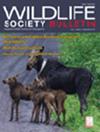一种用于控制入侵鹦鹉的新型长尾小鹦鹉选择性喂食器
IF 1.5
4区 环境科学与生态学
Q3 Environmental Science
引用次数: 1
摘要
超过40种鹦鹉,鹦鹉目的成员,已经在全球建立了非本地种群。僧鹦鹉(Myiopsitta monachus)是世界上最具入侵性的鸟类之一。在它们的引进范围内,僧侣长尾小鹦鹉的数量对当地物种、栖息地、经济和人类安全造成了负面影响。由于僧侣长尾小鹦鹉的智慧,致命的种群管理变得复杂,因为它们会迅速改变行为以避免风险。此外,由于长尾小鹦鹉非常有魅力,由于公众的争议,致命的控制计划已经停止。避孕药DiazaCon已被证明可以有效地降低僧侣长尾小鹦鹉和其他鹦鹉的生育能力。在现场应用中,化学控制剂(如毒物和避孕药具)必须以禁止非目标物种进入的方式施用。我们开发并测试了一种长尾小鹦鹉选择性喂食器。喂食器允许长尾小鹦鹉进入,并通过降低喂食器周围的金属丝隔离帘来限制非目标鸟类的进入,需要一个趾趾安排来获取食物。我们在美国佛罗里达州用圈养和自由放养的僧侣长尾小鹦鹉和非目标物种试验了长尾小鹦鹉选择性喂食器。在整个研究过程中,僧侣长尾小鹦鹉成功地从长尾小鹦鹉选择性喂食器中获取食物。非目标物种的平均每日喂食次数从未实施隔离幕时的每天近16次减少到实施隔离幕时的每天<1次。我们的研究结果表明,长尾小鹦鹉选择性喂食器是一种很有前途的工具,可以用化学控制剂处理诱饵来管理僧侣长尾小鹦鹉和其他非本土长尾小鹦鹉种群,但实施的成功可能会因目标物种、地点、当地动物多样性和替代饲料的可用性而异。本文章由计算机程序翻译,如有差异,请以英文原文为准。
A novel parakeet‐selective feeder for control of invasive psittacines
Over 40 species of parrots, members of order Psittaciformes, have established nonnative populations globally. Monk parakeets (Myiopsitta monachus) are among the most invasive bird species worldwide. In their introduced range, populations of monk parakeets have caused negative impacts on native species, habitats, economies, and human safety. Lethal population management has been complicated by the intelligence of monk parakeets, as they quickly alter behavior to avoid risks. Further, lethal control programs have been halted due to public controversy, as parakeets are highly charismatic. The contraceptive DiazaCon has been demonstrated to effectively reduce fertility in monk parakeets and other psittacines. In field applications, chemical control agents (e.g., toxicants and contraceptives) must be delivered in a manner that prohibits access by nontarget species. We developed and tested a parakeet‐selective feeder. The feeder allows access by parakeets and limits access by nontarget bird species by lowering a wire exclusion curtain around the feeder, requiring a zygodactyl toe arrangement to access food. We tested the parakeet‐selective feeder in trials with captive and free‐ranging monk parakeets and nontarget species in Florida, USA. Monk parakeets successfully accessed food from the parakeet‐selective feeder throughout the study. The mean number of daily feeder uses by nontarget species decreased from a high of nearly 16 uses per day when the exclusion curtain was not implemented to <1 use per day when implemented. Our findings suggest the parakeet‐selective feeder is a promising tool for delivery of bait treated with chemical control agents to manage monk parakeets and other nonnative parakeet populations, but implementation success will likely vary by target species, location, local faunal diversity, and availability of alternative forage.
求助全文
通过发布文献求助,成功后即可免费获取论文全文。
去求助
来源期刊

Wildlife Society Bulletin
BIODIVERSITY CONSERVATION-
CiteScore
2.10
自引率
13.30%
发文量
0
期刊介绍:
The Wildlife Society Bulletin is a journal for wildlife practitioners that effectively integrates cutting edge science with management and conservation, and also covers important policy issues, particularly those that focus on the integration of science and policy. Wildlife Society Bulletin includes articles on contemporary wildlife management and conservation, education, administration, law enforcement, and review articles on the philosophy and history of wildlife management and conservation. This includes:
Reports on practices designed to achieve wildlife management or conservation goals.
Presentation of new techniques or evaluation of techniques for studying or managing wildlife.
Retrospective analyses of wildlife management and conservation programs, including the reasons for success or failure.
Analyses or reports of wildlife policies, regulations, education, administration, law enforcement.
Review articles on the philosophy and history of wildlife management and conservation. as well as other pertinent topics that are deemed more appropriate for the Wildlife Society Bulletin than for The Journal of Wildlife Management.
Book reviews that focus on applied research, policy or wildlife management and conservation.
 求助内容:
求助内容: 应助结果提醒方式:
应助结果提醒方式:


